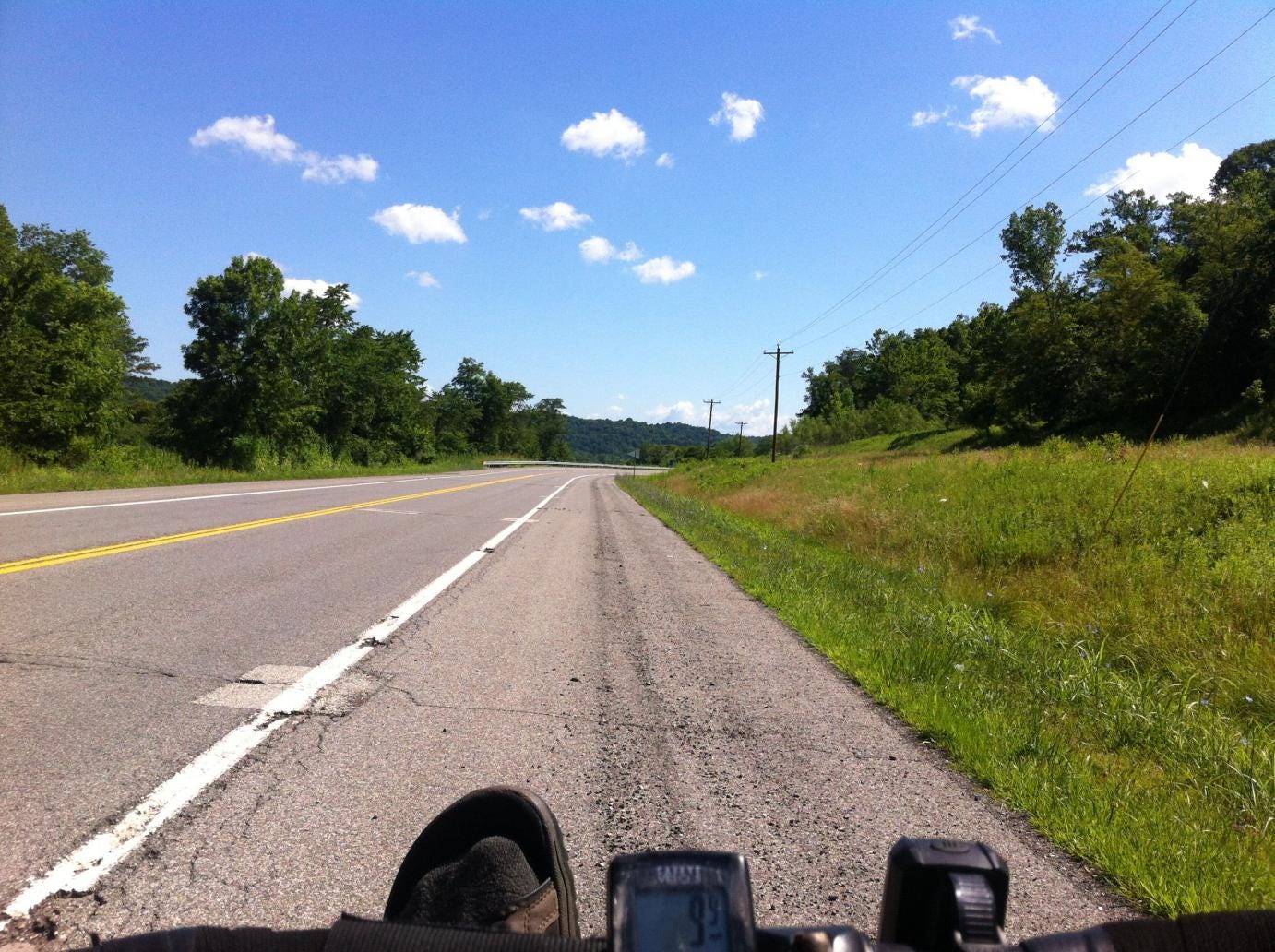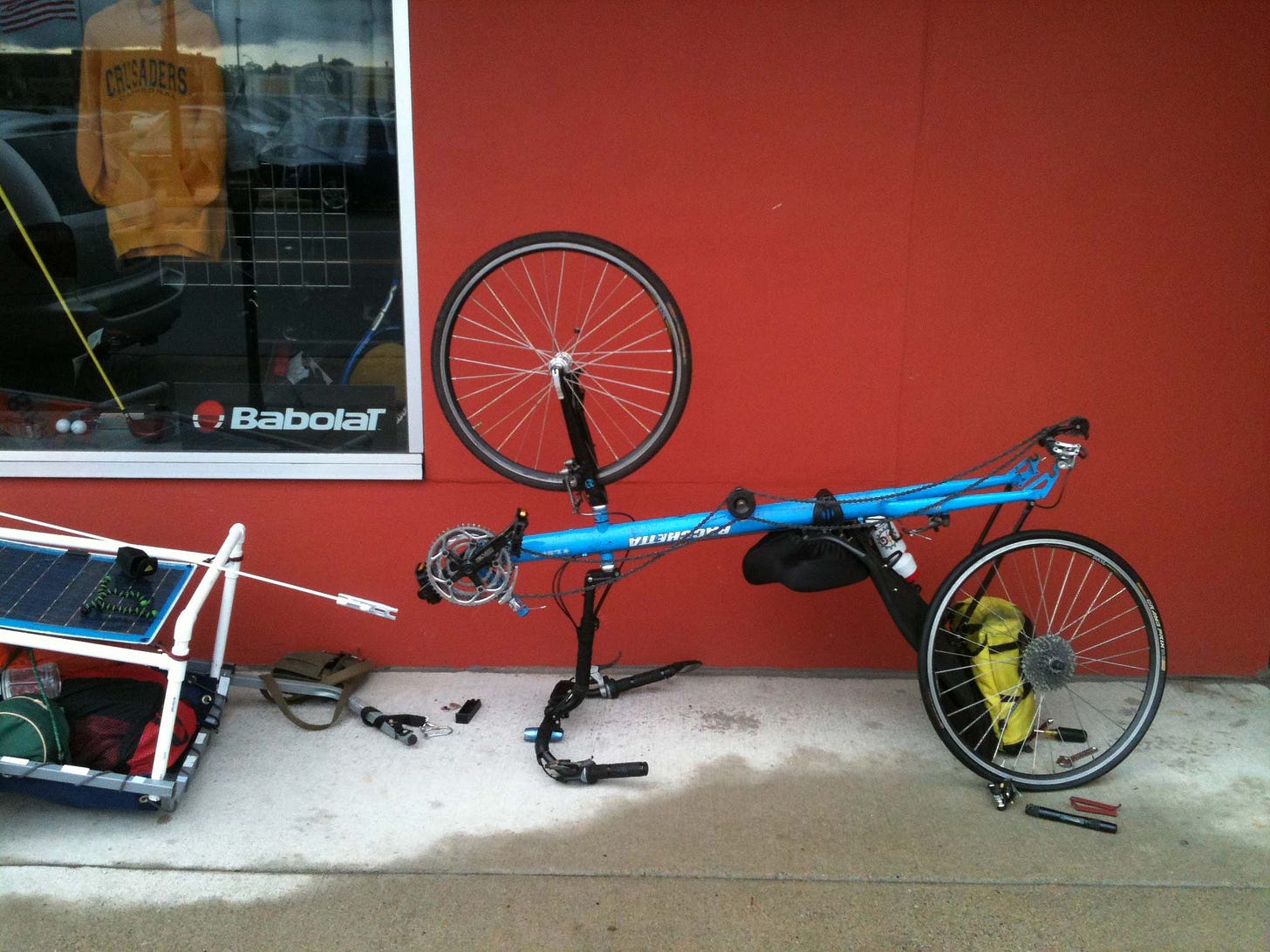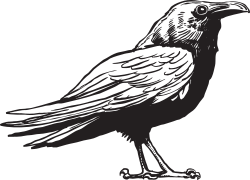BikeTwain, Volume I
The first in a never-ending series of stories about almost dying on a bike.
About ten years ago I got on a recumbent bike and set off on a highway out of Bemidji, Minnesota, bound for New Orleans along the length of the Mississippi River, riding under a reflective flag emblazoned with the legend, “BikeTwain.” It was a wild time, or as wild as you can get spending a month by your lonesome, pedaling ceaselessly for hour upon hour in the stifling heat, keeping an ear cupped for enraged drivers behind and dogs vectoring in from driveways like anti-ballistic missiles, sleeping in RV campgrounds and squat motels with nightstands full of cigarette ashes and terrifying shrieked arguments in the parking lot at four in the morning. If that’s your idea of wild, then yeah, it was right on the money.
Fortunately I love that sort of thing, so I had a ball. When I got back I had a thousand stories and a ken to write them all down, which I did up to a point. Then one day, maybe two hundred miles from the end of the tale, in the midst of struggling to portray the relentless poverty that characterized most of the route south of Iowa, I stopped. I’m not sure I’ve written a single word on the subject since, other than “the” and “and.”
I expect I stopped because deep inside I knew that a day would come when I urgently needed a few of those stories to meet a fortnightly goal. At least that’s what I’m telling myself this week.

Day three of my trip was July the Fourth, and I began it near Brainerd, a city made famous by Carl Showalter and his partner Gaear Grimsrud, played by Steve Buscemi and Peter Stormare respectively in the film Fargo. When I was pulled over by a state trooper just outside the city, I so wanted to tell him that we could “take care of this right here in Brainerd,” but I figured he wouldn’t take kindly to jokes about the murder of a police officer so I swallowed my tongue and waited patiently for him to finish haranguing me for not riding on the access road parallel to the highway.
It was a long but pleasant day—I’d been badly sunburned my first day out but most of the day’s riding was spent on empty country roads lined with corn and serenaded sweetly by insects and birds. I ate tacos for lunch in a little carniceria in Little Falls, watching Spongebob in Spanish while the owner’s kids marveled that a gringo should share their interests. A brief rainstorm passed through while I ate; otherwise the weather was fine and sunny.
At around five o’clock I pulled up at the office of the St. Cloud Campground and RV Park. While I checked in I requested a Coke, and the woman at the desk brought me one, ice cold and sweet as nectar. I downed it in one go and asked for another. I followed this with a plea for food, and she told me she could prepare a frozen pizza. Not really what I had in mind, but it would save me a trip back into town, so I accepted and ordered another Coke. When the campsite registration was complete I asked for a fourth one, and downed one more still while waiting for the pizza. I ordered three more to take with me, and wound up drinking one of them before the pizza was delivered into my grateful possession. I balanced the pizza on one hand and pushed my bike with the other, struggling to keep up with the campground manager as she led me to my campsite in her golf cart.
I was at one of half a dozen primitive sites at the back of the campground, convenient to the facilities but isolated from the hum of RV air conditioners. I ate my pizza in its entirety—it was surprisingly good—and polished off the remaining Cokes. Filled with fat and sugar I walked to the shower building in the middle of the RV section, enjoying the festive holiday atmosphere. The evening was cool and slightly breezy. Kids thronged the playground and rode bikes around the loop road. Families gathered under canopies, stuffing their faces with hot dogs and cheeseburgers, laughing and talking. I felt relaxed and accomplished.
Returning to my camp I set up my tent, laid out an inflatable pad and my sleeping bag, and missed my rain fly. I dug through my bags but it was nowhere to be seen. This was mildly alarming but the sky was clear and the stars were already shining like falling snow. I’d be fine. As I lay down I could hear fireworks off in the distance, and occasionally blossoms of sparks were visible through the trees. Slowly, weary from the long day’s work, I drifted into a deep sleep.
At one o’clock I woke to a bright flash of light in my face. The world around my tent was garishly lit with a white radiance, like a flare. I had just enough time to open my eyes before the thunder arrived; an ear splitting crack that shook the ground, tailing off to the long rumble of a truckload of bowling balls rolling down a metal slide. I sat bolt upright, my heart leaping in my chest. More flashes of light and a sudden torrent of water, like a great faucet had been opened over my head. I quickly went through my things and pulled out a rain jacket, which I tried to tie over the top of the tent, but it covered no more than thirty percent of the vulnerable area. I gathered together everything that I couldn’t allow to get wet—my phone, a tiny laptop a friend had loaned me for the trip, and my book, Alistair MacLean’s gripping World War Two thriller The Guns of Navarrone.
For a while the jacket kept at least my upper body dry, but in the early going I was more concerned about getting struck by lightning or crushed by a limb from the massive oak tree that stood in the center of my campsite, perhaps twelve feet from my tent. The din of thunder was shocking and more or less constant at first, but gradually its volume attenuated as the rain took over in earnest—a heavy, hard rain that poured in all around me. The “bathtub” floor of my tent—intended to keep water splashing in from the sides—became simply a bathtub, and before long I was sitting in six inches of standing water.
There was no point in trying to weather the storm any further, so I packed up my clothes and sleeping bag and headed for the laundry room, where I spent the next several hours drying my things and reading of the exploits of Keith Mallory and his trusty band of compatriots, all of whom could probably have fashioned a serviceable rain fly out of the hide of a deer or a hapless Wehrmacht soldier. At four-thirty I returned to my camp, packed the remainder of my things, and rolled out of the campground, figuring that at the very least I’d get a huge head start on the day and likely reach my destination—Minneapolis—early enough for a long nap and then a good dinner in a fancy restaurant.
I made just a bare mile before running over a nail. It did a number on my tire—not just a proper puncture, the tire was torn halfway across its breadth. This would not be a quick patch and reinflation; I needed a new tire. I checked my phone and found a bike shop three miles away. Figuring the only way out was through, I began trudging down the road.
When I arrived, the sign on the door told me the store opened at ten, still some four hours away. Honestly I don’t know how I prevented myself from kicking in the giant plate glass windows at this point but perhaps the lack of sleep had left me without the energy to get angry, or at least out of control angry. Instead, I waited.
There was a strange cast of characters roaming around downtown St. Cloud at this early hour—a young guy with some sort of personality disorder appeared and stood awkwardly in front of me asking questions about my bike and my trip, interspersing them with stories about how his knees hurt and debates with himself about whether he ought to catch a bus to New Orleans and meet me there. After a half hour of this I announced I was going to get breakfast, which I did at a Perkins across the street.
As I entered a very hard-looking man, worn face and amateur tattoos, warned me about leaving my bike unattended, leering at me as he said so, as though he intended to steal it the moment my back was turned. I pity any thief who tries to make off with a recumbent bike with a torn tire, so I chuckled and went inside. I chose a table next to a window, figuring I’d watch him struggle with it, but he was gone—apparently the criminal element in St. Cloud doesn’t follow through at seven in the morning.
At ten I went back to the shop, where the mechanic glanced at my bike and said, “Don’t have tires that size.” Now I know that a lot of recumbents have a smaller front wheel but I’d chosen this bike specifically because both the front and rear wheels were standard. I thought maybe he hadn’t looked closely enough, or at all.
“Are you sure?” I asked. He nodded, most of his attention already on another, more expensive bike. “Are there any other bike shops around here?”
“Rod’s.”
So I looked up Rod’s Bike Shop. Distance: three miles.
The day was already heating up as I laboriously pushed my crippled bike and its heavy trailer along the second three-mile hike I’d taken that day. About eleven-thirty I pulled up at Rod’s. Red was an older fellow, maybe in his early 70s. As I approached, he and two other white-haired men sat on the curb outside the shop, shooting the shit Hank Hill-style. I hung out with Rod’s companions, who were affable and curious and full of advice, while Red fixed my bike. He set me up with a new tire—heavier than the one I’d been riding in order to better sustain the towing load—and sold me a couple spare tubes into the bargain.
And so at long last, seven and a half hours after I’d left my campsite, I was finally back on the road.
It was an exhausting ride along the same lonely highways I’d been on the day before, but I was dead tired and found myself struggling to keep my eyes open. I didn’t know if I could actually fall asleep while pedaling, but at some point I decided not to chance it. I stopped in a small park, set a timer, and threw myself in the grass, sinking immediately into a deep sleep that was cut short by a roaring lawn mower pelting my head with pebbles. There would be no rest until Minneapolis, so onward I went.
I was blessed in the late afternoon with a long, winding bike path through light woods and cuts in steep hills. I climbed steadily but on a slight grade, as the path made sometimes as many as four or five switchbacks for a rise of maybe twenty-five feet. It was a pleasant ride, but I pedaled hard, fighting to reach my destination before sunset. But it was not to be.
As the dome of night was clamped down overhead, the path spat me out into a highly industrialized outskirt of Minneapolis. To my left as I pedaled down a highway toward the city center was a sprawling rail yard dominated by the grim towering shadows of grain elevators and awash in the low, lonesome rumble of yard switchers assembling long, serpentine freight trains. To my right were strips of warehouses and suppliers of various contractor materials—electrical and plumbing parts mostly. The highway was mostly deserted but every now and then a semi would loom up out of the darkness with a flash of headlights and a blast of dirty air as it swept alarmingly past me. I took to holding my phone up over my left shoulder whenever I heard an engine behind me, in hopes they would veer to avoid the light rather than, say, homing in on it.
After probably forty minutes of this, including a short ride in heavy downtown traffic during which I managed to drop my water bottle in the middle of an intersection, I passed through Dinkytown, the neighborhood adjacent to the University of Minnesota, and finally pulled up at the hotel a friend had kindly booked for me that night. I checked in and dragged everything to my room, where I unpacked my tent and sleeping bag and draped them over chairs to dry out, dumping a pile of leaves on the bathroom floor in the process. I skipped dinner, opting instead to eat garbage from the snack machine down the hall, took a long shower, and slept the sleep of the dead.
The next day was the next story—every day was a tale unto itself. I’ll just tease it by saying that I spent a significant amount of time lost in St. Paul riding repeatedly through a crowd of people heading to a Britney Spears concert, and wound up spending the night next to a very fragrant pork processing facility. It was a singular month, each crisis bleeding into the next one. But St. Cloud was a peak of difficulty I might touch but would never exceed, and successfully reaching Minneapolis was a watershed. It was the moment I knew I would make it to New Orleans.
There is a certain very appealing simplicity in time spent this way, and I can completely understand how some folks will spend years walking across whole countries or boating across whole oceans. I could feel my mind working every day at three questions: How much further until night? Where would I stay? What would I eat? It seems from the outside like a brutal existence, but the purity of it holds a primal appeal which stands in stark contradistinction from having to ponder such questions as Should I apply for another credit card? Or Which of these billions of YouTube videos should I watch next?
As I told my dad when he was considering a similar trip in a kayak on the Ohio River a few years later, it wasn’t much fun, but it was always enjoyable.
Look, ma! Buttons! Click ‘em all:







"[I]t wasn’t much fun, but it was always enjoyable." There you go.
😊So happy to finally read this...Can’t wait for the next installment!!